After Paris, Saying the Unsayable
Friday the 13th.
Since medieval times, the most unlucky of days.
That was certainly true in Paris. November 13th now joins September 11th, March 11th, July 7th, April 15th–the days of terrorism in New York City 2001, Madrid 2004, London 2005, Boston 2013.
And now, Paris. Again.
There have been countless such attacks in the Middle East and Africa. Too many to enumerate. So common are these incidents, in fact, that in the West we seem to merely shrug when we hear about another such event. A marketplace blown up by a car bomb. A line of workers outside an office building. People at a bus stop. All seemingly random, all disturbingly frequent.
In Paris, 129 were killed, 352 wounded, 99 of those critically.
It doesn’t happen “here.”
Such violence, such random, brutal, inexplicable violence perpetrated by men willing to blow themselves up in an effort to destroy others–as common as it is in the Middle East and Africa, it is that uncommon in the West.
Just a day before the Paris attacks, Beirut, Lebanon had suffered its most deadly attack in years. The Nov. 12 attack left 43 dead, 239 wounded. But unlike France, Europe’s most secular country, Lebanon is a nation fraught with both religious conflict and religious zeal. Lebanon is 50% Muslim, 40% Christian and the remaining percentage is comprised of the Druze. But Lebanon also has Hezbollah–a militant Shia political faction which the U.S. and the rest of the West consider a terrorist organization. But which is part of the Lebanese government. As if the U.S. had the KKK or Aryan Nation as a faction of Congress and every state legislature.
.jpg)
In the West, we don’t have overt terrorists running governments or considered serious political parties. In the West we have no dictatorships. In the West we are oblivious to the realities of day-to-day terrorism and what it is to live under it.
That is, perhaps, a reason we don’t address terrorist violence “there” the way we do “here.” That is, perhaps, why the Beirut bombing was reported and commented upon, but President Obama and Prime Minister Cameron and President Hollade did not take to the airwaves to decry the violence, mourn the victims, lower flags to half-mast, emblazon national monuments with the colors of the flag of Lebanon.
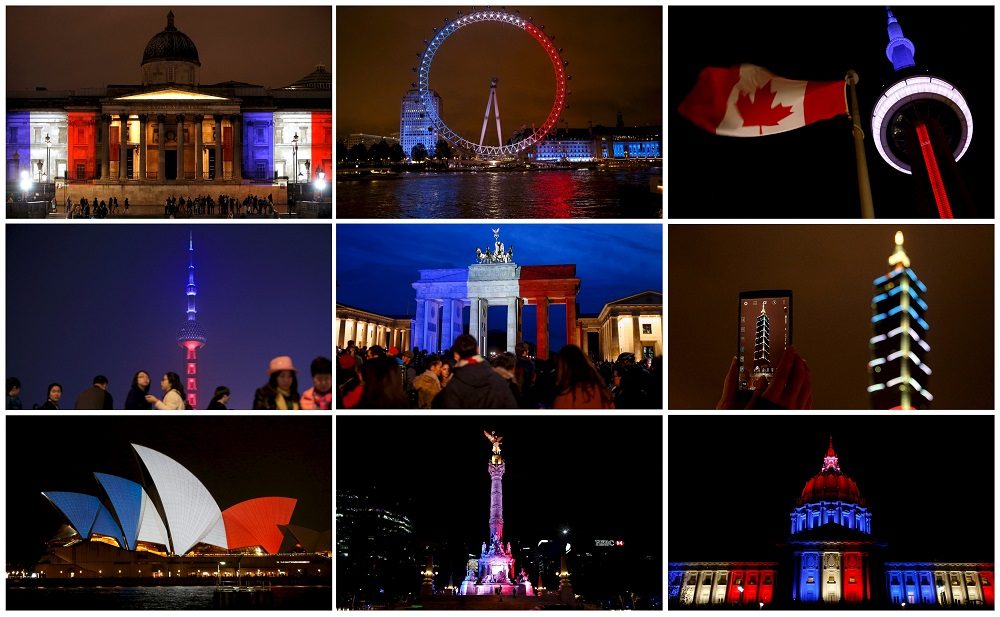
We don’t “know” those people.
We “know” the French.
The Paris attack, which hit in several different places from outside a crowded stadium to a concert hall to a little bistro of the sort for which Paris is legendary, was the second terrorist attack this year.
January 7, the offices of the Charlie Hebdo magazine were hit. Eleven people were killed, 11 others wounded. On January 9, the Hypercacher, a kosher grocery store, was attacked just hours before Shabbat. Four people were killed, 15 held hostage. The same cell of terrorists perpetrated both attacks.
What happened in Paris unnerved Europe. It had been a decade since the London bombings. The feeling of inviolability had perhaps turned to complacency. These things, after all, seemed to happen elsewhere, in those unstable regions of the world were political differences were settled not at negotiations’ tables, but in the streets with car bombs like in Beirut on Nov. 12.
I had written about the January attack for a U.K. publication I write for from the vantage point of a journalist and an historian, my other field of expertise. [http://www.aroomofourown.org/je-suis-charlie-the-lives-we-value-the-lives-we-dont-by-vabvox/ ] I said some of what I had wanted to say, but not all.
Some of those things I will, I think, say now.
***
I was gutted by the Parisian attacks. Paris is one of the world’s most beautiful cities and to see it riven by that kind of destruction–je ne sais pas.
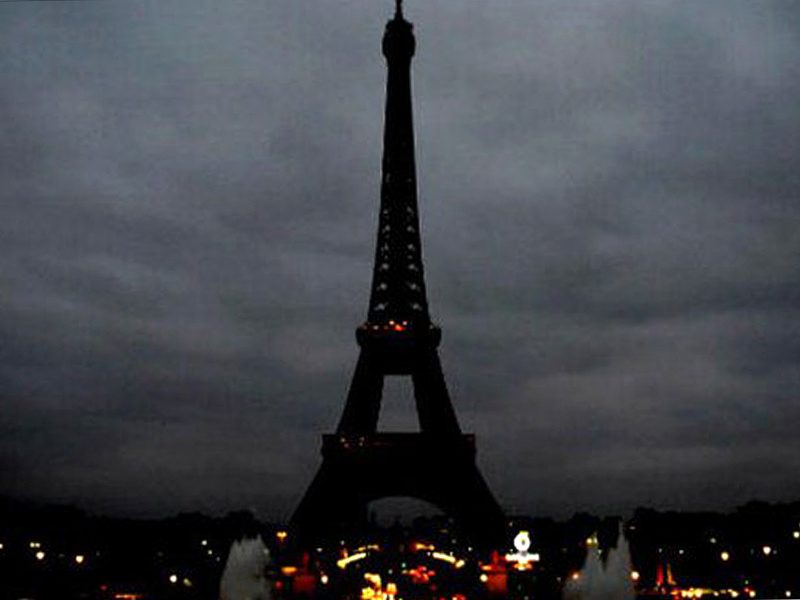
It’s incomprehensible, really.
Like thousands of others in a state of disbelief and heartbreak, I took to Twitter. My first tweets were in French, one of my other languages. Paris est de nouveau frappé–Paris has been hit again.
Ma coeur est avec ce soir #Paris. Cette violence,cette brutale,violence sanglante. Cela est amorale. Je suis désemparé Je suis furieux.
— Victoria Brownworth (@VABVOX) November 13, 2015
and
@VABVOX moi aussi
— Beth Crispin (@iyamiyam) November 13, 2015
But when the news referred to people as “soft targets,” anger began to creep along the edges of the sorrow.
Now human beings are referred to as “soft targets.” Yes we are “soft.” We are flesh & blood. We are human. We have lives. #ParisAttacks
— Victoria Brownworth (@VABVOX) November 13, 2015
And then I said this, because the violence was beginning to seep in among the calls to #Pray4Paris.
I have Muslim friends. Close Muslim friends. Friends I talk to on a weekly and sometimes daily basis. Friends for whom the violence of these terror attacks is as alien as it is to me. Friends for whom I was once again fearful, because who knew what would happen next? Mosques were burnt down in America after 9/11, after Oklahoma City. And so, because collective punishment is the worst thing in the world, because collective punishment was in fact the “rationale” behind the Paris attacks themselves, I said this:
Stop making all #Muslims apologize. The only people to blame for #ParisAttacks are the perpetrators. https://t.co/DiTwpGI3xQ
— Victoria Brownworth (@VABVOX) November 14, 2015
It’s a benign tweet. Not angry. Not vengeful. Just asking that people think.
Many disagreed. My tweet–my innocuous tweet–engendered a torrent of abuse. Dozens of responses suggesting everything from beheading to rape. All written by men who in the same breath decried the violence of the perpetrators.
Brutal irony.
All presuming I was Muslim, because I said don’t demand apologies from Muslims just because they are Muslim.
@VABVOX Hahaha not to them you’re not. You are a mockery of islam. You will get your head sawed off. You’re a mockery of a woman as well.
— Shaun Poaster (@ShaunPoaster) November 14, 2015
I am shocked & saddened by how many people are using the tragedy of the #ParisAttacks to spread more hate, more dissension. Please. Stop.
— Victoria Brownworth (@VABVOX) November 14, 2015
And this:
Patriot. “@bionicbigfoot1: @VABVOX Go spout this tripe in Saudi etc and see what it gets you. Raped, no job, no ed, no rights as a woman..”
— Victoria Brownworth (@VABVOX) November 14, 2015
And this:
Serial harasser. “@ffstjzg: @VABVOX And then we wont need to listen to mentally ill cunts like yourself haranguing men endlessly.”
— Victoria Brownworth (@VABVOX) November 14, 2015
There were more. Dozens more. All from men. All telling me how ignorant I was, how ugly, how I deserved to be beheaded, how Muslims like me–because who but a Muslim would say such a thing?–deserved a horrible death.
Others simply said that all Muslims should be wiped off the face of the earth. Not ISIS, not extremists, but the world’s 1.6 billion Muslims. All of them.The language, ironically or not, was precisely the language being used by the terrorists. Except these men were from the U.S. and U.K. and Australia, not the Middle East, not a terror cell. Yet with each successive attack, I could see that the line is perilously thin between the inchoate anger the victimized feel and the inchoate anger the victimizers feel.
What we don’t say, what is unsayable, is that these violent words come from the same source as the terrorism: men.
These thoughts all come from the same source: men.
This rage that strikes everywhere all comes from men.
Is ISIS our main enemy?
Are our enemies the world’s 1.6 billion Muslims, the women, children and men who are the most frequent victims of ISIS, al Queda, the Taliban, Hezbollah, Hamas?
Not all men, of course. We have to say that. We have to qualify it.
Not. All. Men. A hashtag. A subordinate clause. A politically correct qualifier.
One viral tweet I saw said, “Not all Muslims are terrorists, but all terrorists are Muslims.”
Not all men are terrorists, but all terrorists are men.
There are men in my life that I love dearly. Family, friends, colleagues. One of my closest friends is a gay man–we talk nearly every day and have for nearly 20 years. I don’t want men wiped off the face of the earth the way some want all Muslims wiped off the face of the earth.
What I do want is for male violence to stop ruining the world. I want male violence to stop ruling the lives of women. I want men who aren’t terrorists to stop answering male violence with more male violence.
The language of our leaders in the West–France’s President Hollande, President Obama, the U.K.’s Prime Minister Cameron–it was all the same: We’re going to slaughter you right back. We’re going to wipe you off the face of the earth. Hollande, a Socialist, Obama, a centrist Democrat, Cameron, a moderate right-wing Tory. Male violence knows no party affiliations. The world’s two worst mass murderers, Stalin and Hitler, were at opposite ends of the political spectrum: Stalin who killed 50 million, on the far left; Hitler who killed 16 million, on the far right.
And now we have ISIS–beheading journalists and aid workers and last week, a nine-year-old girl in Kabul and a dozen women. Our close ally, Saudi Arabia, beheads people, too, but for some reason, we find that acceptable.
More than 50 this year alone.
ISIS throws gays off rooftops, burns them alive in cages, rapes lesbians to death. There’s no depravity ISIS won’t visit upon those they deem infidels. We don’t know if the attack on the Bataclan Theatre where the majority of the dead and injured were attacked was because the theatre is Jewish-owned or because, as the letter allegedly from ISIS declared, the theatre was a haven for the prostitution of the West–in other words, women performed there.
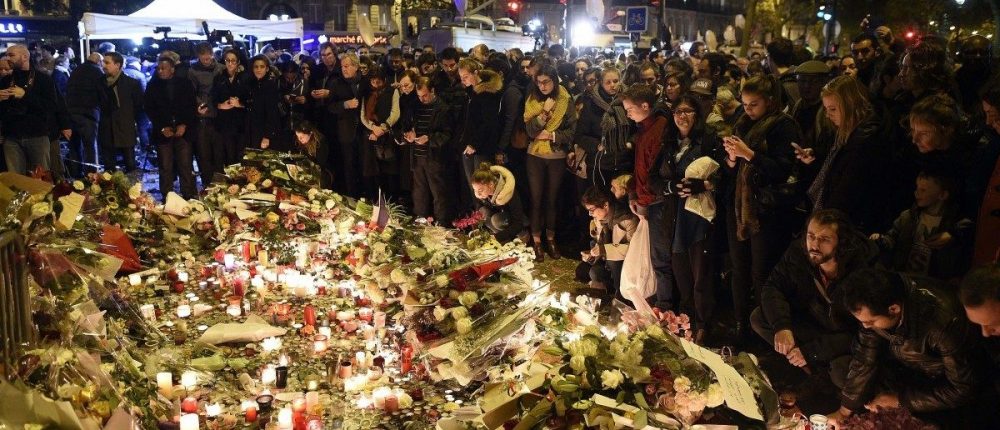
ISIS is not the sole purveyor of male violence in the world. Just the one we are focused on. But without Syria’s dictatorial mass-murdering President Assad, would we have ISIS? And without the support of Assad from Russia’s President Putin, would we have the flood of 2.5 million refugees in Europe?
And what of America?
We haven’t had the number of recruits to ISIS that France has had–they lead the Western world in that. But we have an epidemic of male violence here that has no specific name like ISIS, but it does have numbers: 100,000 shootings last year, more than 43,000 of them fatal. We have mass shootings every week in America–that’s four or more people killed. The shooting at Virginia Tech in 2007 killed 32 people. That’s only a dozen fewer than the attack in Beirut on Nov. 12.
Three years ago 27 people–20 of them first graders–were murdered at Sandy Hook elementary school in suburban Connecticut ten days before Christmas.
Three years ago 12 people were killed and 58 wounded–some paralyzed for life–in a shooting at an Aurora movie theatre in Colorado.
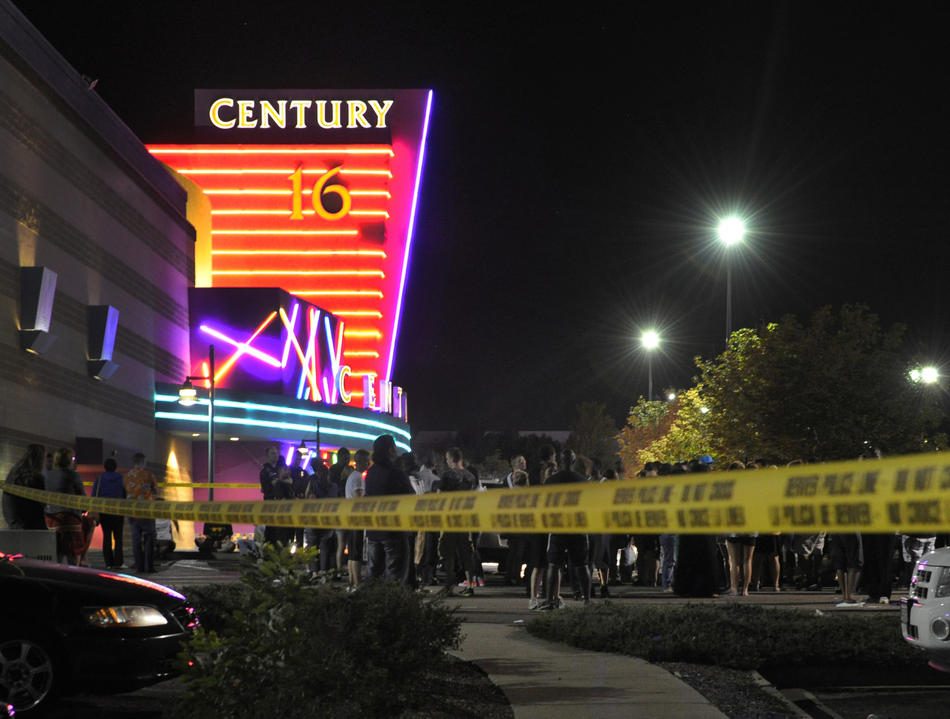
In the month between the first Democratic debate in Las Vegas in October and the second one on Nov. 14 in Iowa, more than 3,000 people were shot in America, 200 of them children. Two of the victims in that month were a lesbian couple, Tattiana Diz, 20 and Alexandra King, 22, shot to death in Asheville, near the border of South Carolina, and their bodies dumped in the river there.
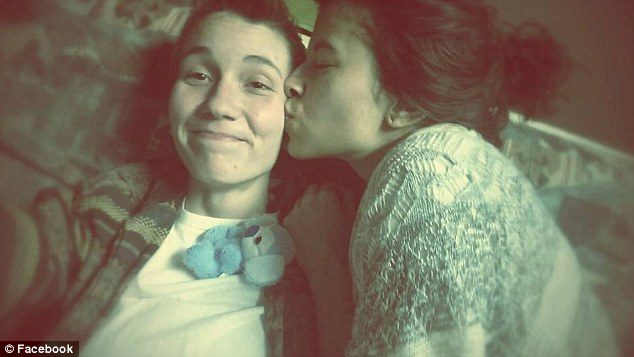
Why is no one lowering their flags for us? Because the carnage here is immense and daily and as endless as any internecine fight between Shia and Sunni in the Middle East.
In the wake of the Paris attacks, which were incomparably brutal, it’s time we asked ourselves the hard questions: how much longer can the world endure the tsunami of male violence that washes over it from every corner of the globe?
When are we going to address this reality? The pandemic of rape, the fact that one in three women in the world–that’s more than a billion women–will be a victim of male violence, according to the World Health Organization?
Men’s rights advocates are quick to point out they are more often the victims of violence than women, and they are. But the perpetrators are also men.
There are no gangs of women trolling the streets or even social media looking for men to attack and abuse.
*
My heart is heavy over Paris. Listening to the witnesses talk–men and women barely able to hold it together–you know they can never unsee the blood, the bits of flesh, the smell of death and dying and above all fear. Their lives are changed forever.
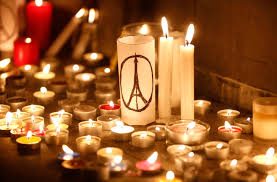
President Obama said the attack on Paris was an attack on all humanity and of course he is right. But so was the attack on Beirut and so was the attack on Sandy Hook and so was the attack in my own neighborhood this weekend that qualifies as a mass shooting because more than four people were shot and more than 400 people have been shot here this year and that’s more than three times the number in Paris, and then there are the constant extra-judicial shootings of black men and women in America by law enforcement and the carnage here is huge. We just act like it’s not terrorism to never know if when you go to the movies in America like when you go to the market in Beirut, if some man who wants to kill you will be there.
I am not saying ISIS isn’t a serious global problem–ISIS has enslaved women and girls, literally raping them to death. ISIS has enslaved young boys as soldiers. ISIS kills with impunity, as the Paris attacks and the mass beheading the week before in Kabul show.
But where does the answer lie?
Is it the “boots on the ground” Republican presidential candidates are demanding of President Obama?
Or does it run much deeper?
Americans say they fear ISIS who have never killed a single American on American soil. Why don’t they fear the 100,000 shootings right here at home by family, neighbors, colleagues?
President Obama said in Turkey on Nov. 16 that the Paris attacks raise new questions. I would argue they raise the same questions, anew.
When will we say the unsayable? Men kill. Men kill with impunity and because they can.
And it’s wrecking the world, from the City of Light to Beirut to Kabul to wherever you live, right now, today, and tomorrow and if we don’t do something, forever.
